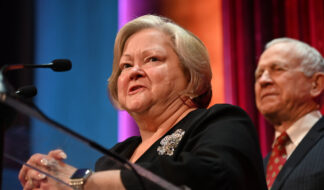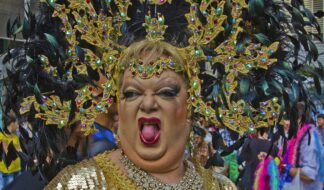Last week, the American Civil Liberties Union took action against two major companies that their clients allege have participated in sex discrimination: McDonald's and Chili's. Additionally, the ACLU is awaiting news from the Supreme Court about cases that consider whether or not federal workplace discrimination law protects LGBTQ people from discrimination on the basis of sex.
McDonald's
On Monday, Jan. 14, the ACLU joined forces with the Fight for $15 minimum wage movement and the law firms of Altshuler Berzon LLP and Outten & Golden LLP to lay the groundwork for the next wave of EEOC sexual harassment charges against the company.
"As one of the country's largest employers and the most profitable fast-food chain, McDonald's must be held accountable," said Gillian Thomas, senior staff attorney, ACLU women's rights project.
At this stage, the ACLU is seeking additional plaintiffs to expand the scope of Equal Employment Opportunity Commission charges and prepare for a potential lawsuit filing. As recently as May 2018, 10 women working in McDonald's restaurants stretching from California to Florida filed EEOC charges of discrimination alleging a wide range of unchecked harassment, perpetrated by supervisors and co-workers.
According to the ACLU, the misconduct documented in the pending EEOC charges runs the gamut from sexually explicit comments to improper touching. The women — one of whom was just 15 years old at the time she was harassed — further contend that McDonald's provides little to no information about harassment or how to lodge a complaint, the ACLU reports. But when they did complain, the women faced retaliation, including cuts in their hours, unwarranted discipline and outright termination.
"McDonald's likes to evade responsibility for the abuse occurring in its restaurants around the country by explaining that the majority are independently owned franchises," Thomas said. "The company contends that civil rights violations occurring at those locations are, to put it bluntly, not its problem. But where a company dictates the smallest details in how franchisees fulfill its brand — down to what kind of pickles they may use — it should not be able to absolve itself of the harassment endured by the people who make that brand profitable."
As a result, McDonald's employees have asked the company to, among other measures, strengthen its policies against harassment; mandate training for all supervisors and employees; create a safe and effective system for receiving and responding to complaints; and convene a committee of workers, representatives from corporate and franchise stores, and workers' rights advocates to identify other remedies.
"These are common-sense demands," Thomas said. "We will be working to assure that they become a reality."
Chili's
On Wednesday, Jan. 16, the ACLU filed an EEOC complaint on behalf of Meagan Hunter, alleging that she was denied a promotion at Chili's because she needed to "dress more gender appropriate." Hunter, a lesbian, asked why she could not wear a chef-style coat like the one her general manager wore and was told, "it's for boys."
"Meagan's story is shocking, but it is far from unique. All too often, women and LGBTQ people are excluded from opportunities at work and school because they don't look the part," said Ria Tabacco Mar, senior staff attorney, ACLU LGBT & HIV project. "In Meagan's case, her boss told her she wouldn't advance professionally because she did not look feminine enough. Yet on plenty of occasions, women and LGBTQ people face criticism if they dress in a manner that's deemed too revealing or attractive."
Laws banning sex discrimination were supposed to put this problem to rest, according to the ACLU. In a landmark 1989 case, the Supreme Court ruled in favor of Ann Hopkins, a woman who was told her "professional" problems would be solved if only she would "walk more femininely, talk more femininely, wear makeup, have her hair styled and wear jewelry." The court recognized that Hopkins, a senior manager, was stuck between a rock and a hard place — out of a job because she was considered "macho" and out of a job if she wasn't seen as macho enough.
"That decision established that employers can't punish employees because they don't match stereotypical notions about how women or men should look and act," Tabacco Mar said. "A growing number of lower courts have also recognized that federal law protects workers like Meagan who experience discrimination because of their sexual orientation."
Yet 30 years after Ann Hopkins's case, Hunter still found herself out of a job because she didn't fit her company's stereotypes about what it means to be a woman. That's why the ACLU filed a charge of discrimination against Chili's with the EEOC.
"When employers punish workers for who they are and what they look like, they lose valuable people like Meagan. That's not only wrong and bad for business — it's also against the law," said Tabacco Mar.
Supreme Court Cases
"These cases illustrate that LGBTQ people face disproportionate rates of workplace discrimination," Tabacco Mar said. "In the past two decades, courts around the country have recognized that discrimination because someone is LGBTQ is a form of sex discrimination prohibited by civil rights laws, yet the Trump administration has argued that federal law doesn't protect LGBTQ people and that companies are free to fire workers because they are LGBTQ."
Altitude Express, Inc. v. Zarda
Zarda v. Altitude Express, Inc. is a case concerning employment discrimination based on sexual orientation. After revealing his sexual orientation to a customer at the skydiving business where he worked in Long Island, New York, Don Zarda was fired. The termination followed a history of anti-gay encounters from the employer. Zarda sued under the New York Human Rights Law, which explicitly prohibits discrimination based on sexual orientation, and under Title VII of the Civil Rights Act of 1964.
Bostock v. Clayton County
Gerald Lynn Bostock v. Clayton County, Georgia is a case concerning employment discrimination based on sexual orientation. Bostock was fired from his position as child welfare services coordinator with CASA in June 2013. His legal team contends that his firing is a violation of Title VII of the Civil Rights Act, which prohibits sex discrimination, and which the legal team argues applies to sexual orientation.
R.G. & G.R. Harris Funeral Homes, Inc. v. EEOC and Aimee Stephens
EEOC v. Harris Family Funeral Homes is a case concerning employment discrimination based on gender identity or expression. The case dates back to 2014 when Aimee Stephens claimed that her former employer, Harris Funeral Homes, violated Title VII of the Civil Rights Act by discriminating against her because of her gender identity. She filed a complaint with the EEOC, and the EEOC subsequently filed a federal lawsuit against the employer. The case argues, as many courts have ruled in the past, that existing federal laws prohibiting employment discrimination based on sex also extend to discrimination based on gender identity.
The Supreme Court has yet to announce if they will take the cases about federal workplace protections and LGBTQ people. If the court decides to hear these cases, oral arguments would likely be scheduled for the fall 2019 term.









